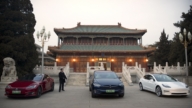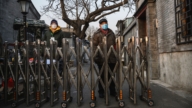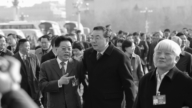【新唐人2013年03月30日讯】大陆国务院新任总理李克强日前要求国务院及各部门,要改革和规范公务接待工作,不得违反规定用公款送礼和宴请、也不得接受地方的送礼和宴请。然而,“上有政策、下有对策”,深谙此道的中共官员们变换手法,照样吃喝不误,公款宴请、娱乐、休闲越来越具有私密性。
大陆国务院办公厅28号对外披露《国务院工作规则》。
新任总理李克强日前在国务院首次全体会议上,要求国务院各部门,禁止公款送礼、宴请。他提出坚决制止奢侈浪费;严控差旅会议经费;各类活动经费纳入预算管理;到基层调研不去风景区参观,不搞特权等。
有媒体报导,《国务院工作规则》完全展现了李克强风格,比前任温家宝更强势,更具企图心。但也有报导说:上有政策、下有对策,中国的公款宴请变花样。
原首都师范大学副教授李元华:“我想从骨子里他(李克强)想执掌政府,但是拿不出具体措施,所以想摆出一个亲民新政的姿态,所以就拿公款吃喝的表面事情来说。所以他说一些话,就当作听听而已,根本执行不下去,因为今天中共腐败已经到根里边了,不是说站出一个人说几句狠话就能解决问题,因为根本就没有推动力。”
网友(大飞龙)认为,“这些规定本来就有,但这30多年不但没有制止、杜绝,反而越演越烈,关键是实施和监督。”
还有网友(郭程)悲观的说,“法律规定不许贪污但还是那么多贪官,在中国讲究的是裙带。家族关系就像织网,单凭你一个新领导走马上任,妄想能管治好平时贪污吃喝嫖赌的五毒官员,说不定你下台了贪官还没倒下。”
香港《明报》引述美国《商业观察》的文章指出,中共官员用于吃喝的支出,每年高达数百亿美元,几乎相当于中国的国防支出。
李元华:“实际上,国务院最大的问题,政府部门的官员他是利用公职去贪污腐败,并不在于吃喝,任何真正有正义感,有所做为的人,在中共体制里都做不成什么事情,他既然能到总理这个位置,实际上他就要符合这个体制。”
前山东大学教授孙文广:“李克强上台以后,关于社会公平,消除贫富差距这样艰钜的任务,我想,现在看不出有太大的改进,反腐败必须从制度面上着手,这方面也看不出,李克强到底有什么招数,如果只是抓住一两件事情去做,我想过去也是一阵风,过去以后,腐败的情况还会继续增长。”
而“英国广播公司”《BBC》引述香港《南华早报》的报导说,中国四个不同地区的官员都对记者表示,公款宴请只不过转入地下,而且排场更加奢侈。
有官员把聚餐地点改设在不起眼的农舍,还聘主厨做菜。因为官员特别喜欢不起眼的农舍,低调却奢华,里头连桑拿都有。
某中国国企老总请客,设在公司食堂。据了解“席上龙虾、刺身一应俱全,多款名贵洋酒任饮”。另外,为了防止拍照传到网上,通行的做法是,喝茅台把商标先撕下来,更为隐秘的办法则是,把茅台酒倒进矿泉水瓶。
这些官员表示,“要办成某些事,豪华宴请是必需的,这种做法不仅发生在福建,全国许多省份都是如此”。
报导说,现在是“令行不止”,公款吃请之风换个手法回潮。
而一名全国人大代表在“两会”期间曾表示,豪华宴会是个长期传统,需要假以时日方可根除。
但试问:假以时日,中共官员腐败的传统可以根除吗? 中国人,还可以继续等下去吗?
采访/李韵 编辑/黄亿美 后制/郭敬
Chinese Officials Banquets Become More Lavish and Covert
China’s State Council has published working rules.
These regulate business meals and
receptions of the state departments.
Yet, by changing tactics, local Chinese Communist
Party (CCP) officials are able to bypass these rules.
They are now still spending public
money on feasting and entertainment.
On March 28, the General Office of China’s State
Council released the latest version of it’s working rules.
Recently, in his first plenary meeting of the State
Department, new Premier Li Keqiang gave instructions.
Li banned using public money in gifting and banquets.
He also proposed ending lavish spending, and
strictly controlling travel and meeting expenses.
He said that all activity expenditures
shall come under budgetary control.
No scenic spot visits shall be arranged during grassroots
inspection tours, and seeking privileges is not allowed.
Media reported that these working rules fully displayed
Li Keqiang’s style, which is “stronger and more ambitious”.
Other media reviewed that local authorities will
find ways to escape executing central policies.
Feasting with public expenses
are now under varied guises.
Li Yuanhua, Chinese history scholar:
“I think he is ambitious in governance.
However, he cannot figure anything out, and tries to
pretend he puts people first, stopping lavish banquets.
His talks can only be heard, but won’t be truly followed.
The CCP is rotten to core, and a few words cannot
truly solve its problem, which lacks a driving force.”
A netizen posted, “All these regulations have existed,
but have never been really observed in the past 30 years.
Rather, abusing public funds has become more widespread.
The crucial answers are implementation and watchdogs.”
Another netizen said that, “laws are trying to ban
corruption, but corrupt officials keep emerging.
Nepotism makes better sense in China’s officialdom.
How can a leader, who just took up his new office, be
able to purge those corrupt, boozing and whoring officials?
They may stay longer than his tenure.”
An article published in Business Insider said that
Chinese officials spend “around 600 Billion Yuan
($94.5 billion) annually” on wining and dining.
This is “the same amount that China
spent on military defense in 2011.”
Li Yuanhua: “China’s biggest problem is that officials
use their positions to collect bribes. It’s not the banquets.
Any one who has real sense of justice
cannot be successful within the CCP system.
Since he can be appointed as the Premier,
he actually meets the system’s criterion.”
Sun Wenguang, former professor, Shandong University:
“Since Li Keqiang took office, he hasn’t yet improved
much on the elimination of the rich-poor gap.
I think the way out of corruption way is its system,
but on which he hasn’t done anything particularly.
If he only focuses on a few issues,
I believe corruption will continue.”
Officials from four different regions revealed the reality,
according to the South China Morning Post (SCMP).
The article said, “The banquets have merely
gone underground, where they are now
being held in a much more lavish style.”
Houses which looked like “understated country
homes” have been turned into venues where
officials could “dine and enjoy saunas”.
“But the interior was decorated to a first
rate standard”, with fine-dining chefs.”
Media reported that a State owned enterprise
president held a banquet in the company’s canteen.
“Abundant lobsters, sea cucumbers, and
many expensive imported wines” were served.
Furthermore, in banquets, the bottle
labels of Maotai wine are usually torn off.
Reportedly, this is to prevent people from
taking pictures to expose on the internet.
And a safer way is to pour Maotai
wine into mineral water bottles.
The SCMP cited a Fujian official.
The official said that “a lavish banquet was a
must when people wanted to get things done.”
“It is not only happening in Fujian, but
in many provinces around the country.”
The official said, “there are plenty of ways at the local
level, for cities to get around these rules from the top.”
A National People’s Congress deputy to told
SCMP that lavish banquets were “a longtime
tradition that would take time to eradicate”.
Now the question is, given time, can
CCP corruption really be eradicated?
Will the Chinese people be willing
to continue to wait for that day?



























